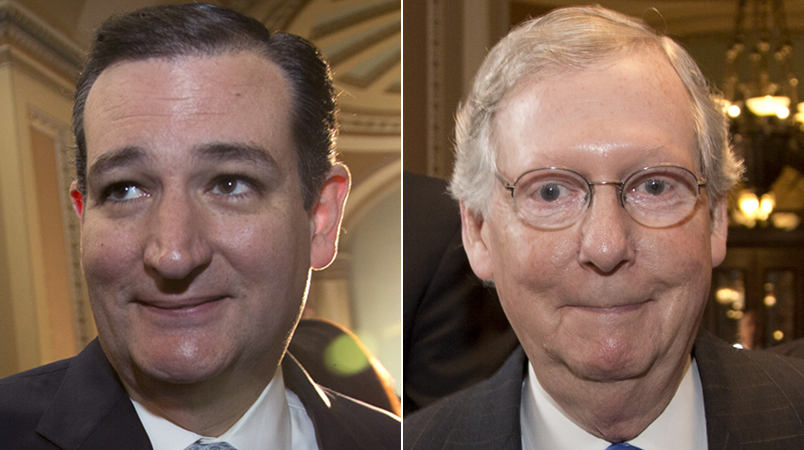Senate Minority Leader Mitch McConnell (R-KY) was forced to spend the long weekend defending his debt limit vote and talking up the importance of compromise to being a good leader.
Sen. Ted Cruz (R-TX) did the exact opposite: he publicly torched his own party’s leadership for walking the plank and portrayed Republican senators a bunch of liars and cowards who think Americans are “rubes.”
Tensions between the leader of the party’s establishment wing and the leader of its tea party wing are reaching an all-time high as the two camps move in opposite directions in preparation for the November congressional elections.
“My job is to protect the country when I can and to step up and lead on those occasions when it’s required. That’s what I did,” McConnell said in Louisville at a campaign event over the weekend, as quoted by CNN. “I negotiated the Budget Control Act with Vice President Biden in August of 2011. It led to a deficit-reduction package that actually reduced government spending for two years in a row for the first time since right after the Korean War.”
The GOP leader was responding to a backlash spurred by Cruz after McConnell and 11 other Republicans voted with Democrats to advance legislation to lift the debt ceiling without any policy add-ons. Ironically, it was Cruz who put them in that position by filibustering and forcing a 60-vote threshold to end debate. If not, Democrats would have carried it to victory alone and Republicans could have averted economic disaster without taking a painful vote.
“Make no mistake about it, this was their desired outcome,” Cruz told radio host Mark Levin. “A lot of Republicans wanted exactly what Barack Obama wanted, exactly what Nancy Pelosi wanted, exactly want Harry Reid wanted, which is to raise the debt ceiling but they wanted to be able to tell what they view as their foolish, gullible constituents back home that they didn’t do it. And they’re mad because, by [my] refusing to consent to that, they had to come out in the open they had to admit what they’re doing. And nothing upsets them more.”
The dynamic suggests a fundamental disagreement within the GOP when it comes to posturing ahead of the mid-term elections. In a way, it reflects the very dynamic that has split the party since 2011. McConnell believes that appearing reasonable and conciliatory is the way to win back the Senate majority this November. Cruz, never one for compromise, believes it’s better for the GOP to dig in ideologically and energize its core tea party base.
“It’s like they think the American people are just a bunch of rubes,” Cruz said, referring to GOP senators who earlier promised to use the debt ceiling to fight for conservative fiscal reforms.
McConnell said he had little choice but to let the “clean” debt limit legislation move forward after the Republican-led House failed to pass one with strings attached. Vying to become majority leader, the incumbent is, at times, squeezed by the left and right as he seeks to defend his own seat against a conservative challenger and a Democratic opponent.
“The Speaker … couldn’t get to 218 no matter what combination,” McConnell said. “So we were confronted with a clean debt ceiling in the Senate or default.”
Making matters awkward is that Cruz himself is in a leadership position of sorts: he’s a vice chairman of the National Republican Senatorial Committee, which is tasked with protecting GOP incumbents and electing more Republican senators. But Cruz has made clear he only answers to McConnell in theory.
The anger Cruz has sparked among Republican establishment players was on display when the Wall Street Journal editorial board lashed him as “the minority maker” — a piece that was tweeted as a “[m]ust-read” by Sen. John McCain (R-AZ), who has previously feuded with Cruz.
Just weeks ago, there had been an emerging conventional wisdom that Cruz was attempting to make nice with GOP leaders after goading them into a self-defeating government shutdown last fall. That is proving false. What’s becoming clearer is McConnell and Cruz want to move the party in opposite directions ahead of a promising mid-term election this fall.
Republicans downplay these quarrels and portray them as healthy family debates. They’re rightly optimistic about the 2014 elections as they’re defending 15 mostly safe seats while Democrats defend 21 seats, many of them in red states. Democrats are relying on the GOP infighting to help their chances.
“Ted Cruz’s decision on the debt limit was another weapon in the arsenal as he continues to lead Tea Party conservatives in the civil war he’s waging on the NRSC and their Senate candidates,” said a Democratic strategist, who wasn’t authorized to speak on the record. “His motives are party purification and they complicate Republican efforts in states up and down the Senate map.”






